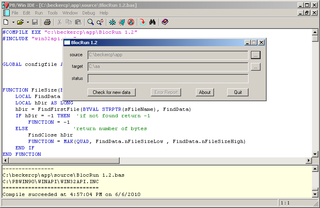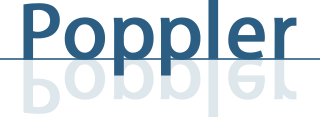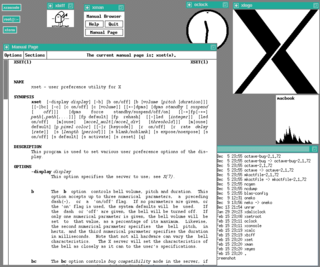
Links is an open source text and graphic web browser with a pull-down menu system. It renders complex pages, has partial HTML 4.0 support, supports color and monochrome terminals and allows horizontal scrolling.

Allegro is a software library for video game development. The functionality of the library includes support for basic 2D graphics, image manipulation, text output, audio output, MIDI music, input and timers, as well as additional routines for fixed-point and floating-point matrix arithmetic, Unicode strings, file system access, file manipulation, data files, and 3D graphics. The library is written in the C programming language and designed to be used with C, C++, or Objective-C, with bindings available for Python, Lua, Scheme, D, Go, and other languages. Allegro comes with extensive documentation and many examples.

PowerBASIC, formerly Turbo Basic, is the brand of several commercial compilers by PowerBASIC Inc. that compile a dialect of the BASIC programming language. There are both MS-DOS and Windows versions, and two kinds of the latter: Console and Windows. The MS-DOS version has a syntax similar to that of QBasic and QuickBASIC. The Windows versions use a BASIC syntax expanded to include many Windows functions, and the statements can be combined with calls to the Windows API.
Encapsulated PostScript (EPS) is a DSC-conforming PostScript document with additional restrictions which is intended to be usable as a graphics file format. In other words, EPS files are more-or-less self-contained, reasonably predictable PostScript documents that describe an image or drawing and can be placed within another PostScript document. Simply, an EPS file is a PostScript program, saved as a single file that includes a low-resolution preview "encapsulated" inside of it, allowing some programs to display a preview on the screen.
OpenType is a format for scalable computer fonts. It was built on its predecessor TrueType, retaining TrueType's basic structure and adding many intricate data structures for prescribing typographic behavior. OpenType is a registered trademark of Microsoft Corporation.
A computer font is implemented as a digital data file containing a set of graphically related glyphs, characters, or symbols such as dingbats. Although the term font first referred to a set of movable metal type pieces in one style and size, since the 1990s it is generally used to refer to a set of digital shapes in a single style, scalable to different sizes. A font family or typeface refers to the collection of related fonts across styles and sizes.

A few projects exist to provide free and open-source Unicode typefaces, i.e. Unicode typefaces which are open-source and designed to contain glyphs of all Unicode characters. However, there are also numerous projects aimed at providing only a certain script, such as the Arabeyes Arabic font. The advantage of targeting only some scripts with a font was that certain Unicode characters should be rendered differently depending on which language they are used in, and that a font that only includes the characters a certain user needs will be much smaller in file size compared to one with a large number of glyphs. Unicode fonts in modern formats such as OpenType can in theory cover multiple languages by including multiple glyphs per character, though very few actually cover more than one language's forms of the unified Han characters.

GDK is a library that acts as a wrapper around the low-level functions provided by the underlying windowing and graphics systems. GDK lies between the display server and the GTK+ library, handling basic rendering such as drawing primitives, raster graphics (bitmaps), cursors, fonts, as well as window events and drag-and-drop functionality.

misc-fixed is a collection of monospace bitmap fonts that is distributed with the X Window System. It is a set of independent bitmap fonts which—apart from all being sans-serif fonts—cannot be described as belonging to a single font family. The misc-fixed fonts were the first fonts available for the X Window System. Their individual origin is not attributed, but it is likely that many of them were created in the early or mid 1980s as part of MIT's Project Athena, or at its industrial partner, DEC. The misc-fixed fonts are in the public domain.

FontForge is a font editor which supports many common font formats. Developed primarily by George Williams until 2012, FontForge is free software and is distributed under a mix of the GNU General Public License Version 3 and the 3-clause BSD license. It is available for operating systems including Linux, Windows and macOS and is localized into 12 languages.

Xming is an X11 display server for Microsoft Windows operating systems, including Windows XP and later.
Meiryo is a Japanese sans-serif gothic typeface. Microsoft bundled Meiryo with Office Mac 2008 as part of the standard install, and it replaces MS Gothic as the default system font for Vista on Japanese systems.

Poppler is a free software utility library for rendering Portable Document Format (PDF) documents. Its development is supported by freedesktop.org. It is commonly used on Linux systems, and is used by the PDF viewers of the open source GNOME and KDE desktop environments.

XPaint is a free open-source image editing program for bitmap images on the X Window System on Unix-like operating systems. Its main goal is to be a lightweight and simple to use raster graphics editor.

ChiWriter is a commercial scientific text editor for MS-DOS, created by Cay Horstmann in 1986. It was one of the first WYSIWYG editors that could write mathematical formulas, even on IBM PC XT computers that were then common.
In computing, a bitmap is a mapping from some domain to bits. It is also called a bit array or bitmap index.

The GNU Unifont by Roman Czyborra is a free bitmap font that covers the entire Unicode Basic Multilingual Plane (BMP), using an intermediate bitmapped font format.











